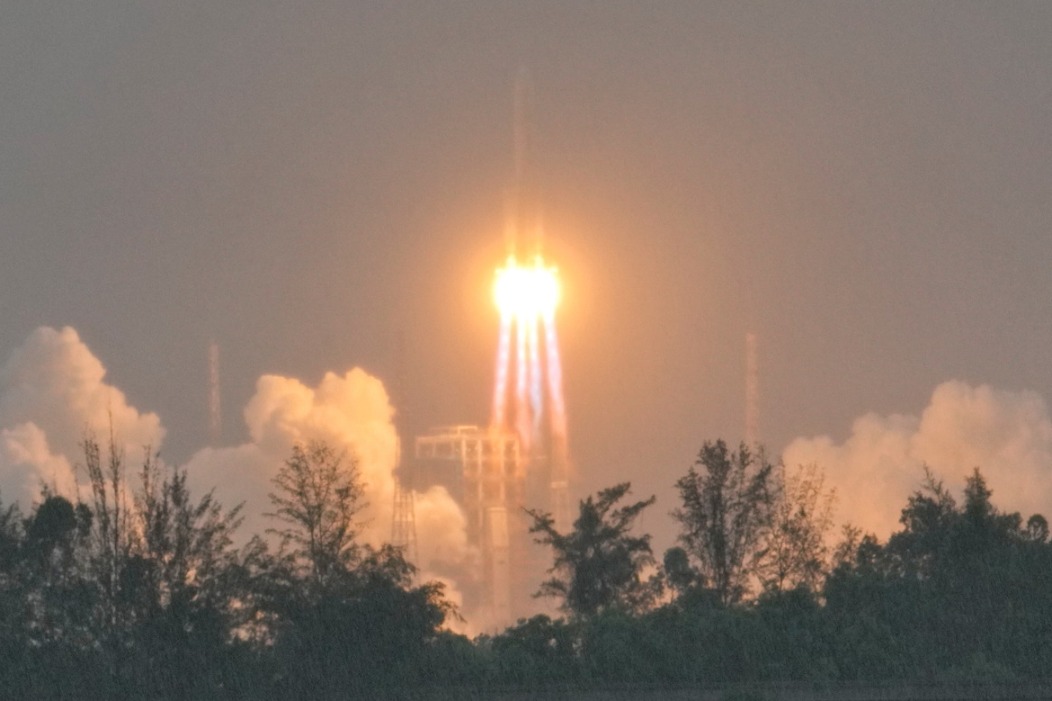US online grocery deliverers expand post-pandemic
By BELINDA ROBINSON in New York | chinadaily.com.cn | Updated: 2022-03-04 10:59

When American consumers turned to online grocery delivery services amid the coronavirus pandemic to avoid venturing into brick-and-mortar stores, venture capitalists seized on the opportunity to invest billions in a booming market.
The investors poured $18.4 billion into online grocery startups last year and $6.8 billion in general food-delivery startups, including groceries and restaurant takeout orders, PitchBook Data Inc, a data research company found.
But as the pandemic wanes and consumers feel more confident to shop at supermarkets again, a report by Bloomberg suggests that while there still will be growth in the sector, companies will have to broaden what they offer to stay relevant post-pandemic.
"Meal delivery services [will] look for new ways to grow in cities big and small," Bloomberg reported last month.
Instacart, a 10-year-old grocery delivery company based in San Francisco, has already announced plans to expand its technology.
It will provide the underlying infrastructure and software tools for grocery store checkouts and fulfillment centers, websites and smart shopping carts.
The business began offering enterprise technology to grocery partners in 2017. Instacart's enterprise technology powers e-commerce platforms for grocers ALDI, Costco Canada, Heinen's, Kroger, Publix, Sprouts, The Fresh Market, Walmart Canada and Wegmans.
In October, Instacart, acquired Caper AI, a leading AI-powered shopping cart and checkout technology platform. Instacart also acquired FoodStorm, to offer order-ahead and catering technology for retailers.
In March 2021, Instacart raised $265 million from investment firms Sequoia Capital and D1 Capital Partners, Andreessen Horowitz and others, according to The Wall Street Journal.
Instacart CEO Fidji Simo said in a statement: "We'll continue to deepen our investment in our suite of enterprise technology services, unlocking new solutions that help power ecommerce platforms of retailers across North America."
DoorDash, the market-leading on-demand delivery platform, announced Thursday that it had entered into a definitive agreement to acquire Bbot, the hospitality technology startup.
Bbot's products and technology will be added to the DoorDash platform. It will offer restaurateurs and other food and beverage venue operators and merchants solutions in-store and online, including in-store digital ordering and payments.
Tom Pickett, DoorDash's chief revenue officer, said in a statement: "We're excited to bring our combined suite to an even wider selection of merchants including bars, hotels, and ghost kitchens."
DoorDash also has partnered with Chase bank to give free DashPass memberships to millions of credit card holders. It plans to raise fees on McDonald's Corp restaurants that are slow to produce orders.
Founded in California in 2013, DoorDash connects consumers with local and national businesses across the US, Canada, Australia, Japan and Germany.
Uber Eats, another food delivery service app with 24 percent of the market, according to Bloomberg, acquired food delivery service Postmates in November 2020 for $2.65 billion in stock.
Since then, Uber Eats has diversified to offer delivery for groceries, alcohol, convenience, flowers, retail and more.
In November, Uber Eats created Uber One, a membership service costing $9.99 per month or $99.99 per year. It offers money off late deliveries and one fee for unlimited delivery as well as other perks.
Grubhub, once the leader in US food delivery service, is a global online food delivery marketplace with 32 million customers and connection to 300,000 restaurant partners in more than 4,000 US cities.
Grubhub forged several partnerships this year, with three companies aimed at broadening its base and easing operations.
They are Restaurant Revolution Technologies, a unified web, mobile and voice-order management software platform; ItsaCheckmate, a technology provider that will streamline digital orders and menus, and BuyK, a real-time retail service capable of providing groceries and essential items to customers' doorsteps in 15 minutes or faster.
Gopuff, an instant delivery service in New York, partnered with several companies this month to broaden its reach, offering customers discounts on fuel, grocery, insurance and vehicle maintenance, as well as access to tax services and mileage tracking tools.
In July, Gopuff raised $1 billion from investors Fidelity Management and Research, SoftBank Vision Fund 1, Blackstone Inc's Horizon platform and Guggenheim Investments, according to The Wall Street Journal. The company is valued at $15 billion.
Online groceries and related apps accounted for more than half of the total $39.3 billion invested in 2021 across the entire food tech sector, according to the Journal.
























